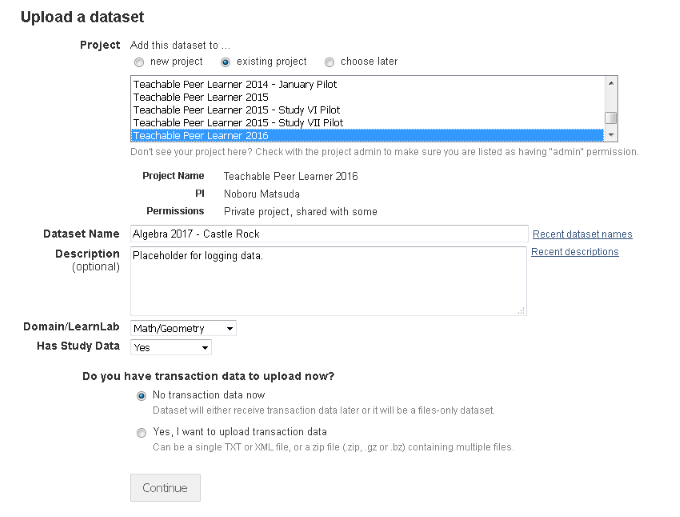Logging New Data
There are a number of ways to log data from your course or study to DataShop. Important factors for selecting a method are the stage and technology of the tutoring system implementation. We'll examine a variety of cases in detail below, including each of their requirements and benefits.
The definitive reference for the logging format accepted by DataShop is the Guide to the Tutor Message format. This guide is intended primarily for software developers who to want implement logging in an educational tutoring application, or convert existing logs created by a tutoring application.
- Getting Started - Project Assignment
- Logging URLs
- CTAT- and OLI-based tutors
- Javascript tutors
- Java tutors or educational applications not CTAT- or OLI-based
- Tutors deployed via Carnegie Learning
- Tutors not created in Java or Flash
Getting Started - Project Assignment
Prior to logging data, you may want to reserve the dataset and assign it to a project so that you can view your data without our assistance. Otherwise, you will need to contact us to obtain access to the data after logging begins. You can create a "placeholder" (or files-only) dataset for one of your projects by visiting the Upload a dataset page. Choose the project or create a new one, and elect for "No transaction data now". After the dataset is created, you can access the data as it becomes available from the logging servers.

Logging URLs
Tutors or applications logging to DataShop should use one of the following URLs based on the status of data collection and the study in general. See the log conversion schedule for exact log conversion times. If you don't see your data, please contact us.
| Name | URL | Description |
|---|---|---|
| DataShop QA | https://pslc-qa.andrew.cmu.edu/log/server | Log here to test that logging works from your application, course, or study, and to verify the content of your log messages. This server is for test data only, not for data from real subjects. No research can be done on data collected on this server. Processed logs are generally available in the DataShop QA web application within two hours: https://pslc-qa.andrew.cmu.edu/datashop |
| DataShop Production | https://learnlab.web.cmu.edu/log/server | Log here to record real student data from a study or course. Processed logs are generally available in the DataShop Production web application the following day: https://pslcdatashop.web.cmu.edu/ |
CTAT- and OLI-Based Tutors
Any tutor created with the Cognitive Tutor Authoring Tools (CTAT) or Open Learning Initiative's (OLI) tools has logging functionality built-in.
Information on configuring logging in these tools can be found here.
Javascript tutors
A third-party library has been created to support tutors written in Javascript. The code is available for download from GitHub.
Java tutors or educational applications not CTAT- or OLI-based
If you are creating a Java tutor or educational application and would like to log to DataShop, download and use the existing logging library. The Java logging library includes well-documented APIs and sample applications for learning to integrate logging functionality into your application. Also see the Guide to the Tutor Message format for more on the logging format produced by the logging libraries.
Tutors deployed via Carnegie Learning
Carnegie Learning provides logging of tutors deployed in their curriculum management system. To view these logs in DataShop, the logs must first be harvested from the local machines used in the study. As honest broker, Carnegie Learning then anonymizes the data and provides DataShop with converted logs.
If you are running a study involving Carnegie Learning tutors and you would like to use DataShop, please contact us and inform us of the location of the study, who's involved, and the timing of the study. Early notice is appreciated.
Tutors not created in Java or Flash
An existing project with sufficient technical resources may be best suited to implementing logging in a different language. If so, developers should consult the Guide to the Tutor Message format. In this case, the tutor should write log data to files, and the files can be zipped and sent to us.
 Note: DataShop
currently supports versions 2 and 4 of the logging
format.
Note: DataShop
currently supports versions 2 and 4 of the logging
format.

